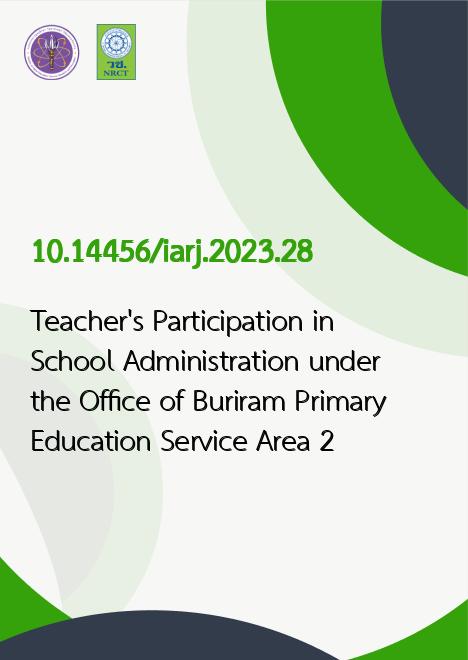
|
Teacher’s Participation in School Administration under the Office of Buriram Primary Education Service Area 2 |
|---|---|
| รหัสดีโอไอ | |
| Creator | Channarong Sooksungnoen |
| Title | Teacher’s Participation in School Administration under the Office of Buriram Primary Education Service Area 2 |
| Publisher | DR.KEN Institute of Academic Development and Promotion |
| Publication Year | 2566 |
| Journal Title | Interdisciplinary Academic and Research Journal |
| Journal Vol. | 3 |
| Journal No. | 1 |
| Page no. | 417-432 |
| Keyword | Participation, School Administration, Decision, Evaluation |
| URL Website | https://so03.tci-thaijo.org/index.php/IARJ/about |
| Website title | https://so03.tci-thaijo.org/index.php/IARJ/article/view/265869 |
| ISSN | 2774-0374 |
| Abstract | Participatory management is a principle and concept that is talked about a lot today. It can be applied to every organization, every project or activity, and when it comes to school management and participatory management, It is an opportunity for workers or those involved in the work to feel attached to the job or organization. The purposes of this research were 1) to study the level of teachers' participation in school administration. And 2) to compare teachers' participation in school administration classified by sex, educational background, and teaching experience. This study was conducted with schools under the Buriram Primary Educational Service Area Office 2. The population consisted of 2,357 teachers in educational institutions under the Buriram Primary Educational Service Area Office with 2,342 sample sizes. The research tool was a questionnaire on teachers' participation in school administration. The statistics used to analyze the data were frequency, percentage, mean, and standard deviation, and the statistics used to test the hypothesis were t-test, and F-test. The results showed that; (1) Teachers' participation in school administration as a whole was at a high level, in descending order of averages as follows; participation in operations, participation in decision-making, participation in evaluation, and participation in benefits respectively. (2) Comparing teachers' participation in school administration classified by gender, educational background, and different teaching experiences, their participation in school administration as a whole and each |